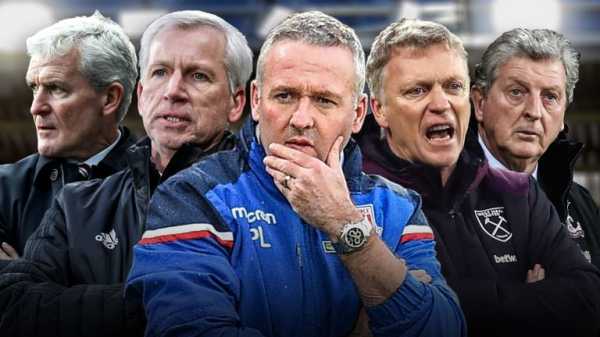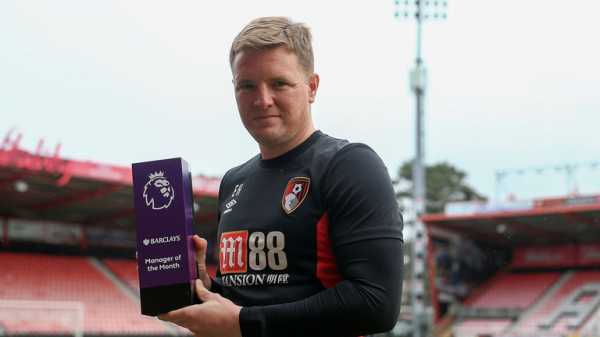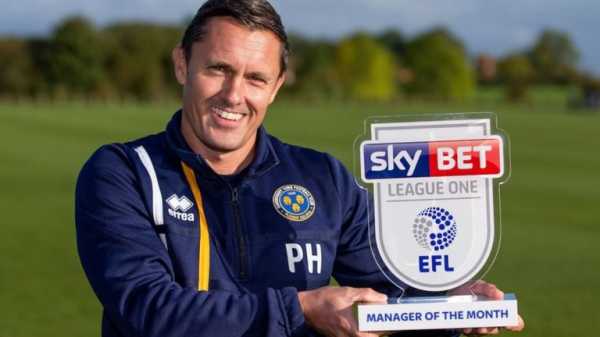
As British bosses struggle at the foot of the Premier League, the justification for ignoring young coaches disappears, writes Adam Bate.
The 68-year-old Arsene Wenger made headlines earlier this week by bemoaning the treatment he receives because of his advancing years. “The older you get the more it becomes a little bit age discrimination,” argued the Arsenal manager. But it is a strange time to make the point. In one sense, it has never been a better time to be a veteran coach.


Arsenal vs Stoke
April 1, 2018, 12:30pm
Live on

Get Sky Sports Get a Sky Sports pass
Never before have struggling Premier League sides turned to experienced British managers with such regularity. It began in September when Roy Hodgson pitched up at Crystal Palace. In November alone, Sam Allardyce, David Moyes and Alan Pardew returned. Paul Lambert followed. Mark Hughes is just the latest tasked with turning around a team’s fortunes.
Every one of those teams were in the bottom four when they arrived. Some will even succeed in steering their sides away from danger. But with Alan Pardew adrift at the bottom with West Brom and others receiving an underwhelming response from fans, one wonders whether those who have failed to inspire before deserve to keep getting these chances.

Much is made of the influx of foreign managers into the Premier League, but there are still eight British managers in there, as well as former Republic of Ireland international Chris Hughton. Among them, the majority are well over 50. Only long-serving Bournemouth boss Eddie Howe is under the age of 45. Where are the opportunities for Howe’s peers?
The contrast between the Premier League and the Bundesliga is marked – and not because that league does not have foreign managers. There are 13 Germans currently in charge of Bundesliga clubs and, remarkably, no fewer than five of them are still in their thirties – with Hoffenheim head coach Julien Nagelsmann only reaching that landmark in July.


C Palace vs Liverpool
March 31, 2018, 11:30am
Live on

Get Sky Sports Get a Sky Sports pass
Of course, Bayern Munich boss Jupp Heynckes is the outlier at 72. But he could well be replaced by 44-year-old Thomas Tuchel in the summer and the next oldest German coach in the Bundesliga is 53. That is younger than Hughes, Pardew and Moyes let alone Hodgson and Sam Allardyce. The elder generation in Germany has been moved on.
Some might suggest that these German coaches are just better than their English counterparts – but speak to those in the know – and this is not the picture they paint. Edu Rubio, a Spanish youth coach at MK Dons, is highly thought of within his own country’s FA and talks enthusiastically about the “giant awakening” that has occurred in English coaching.
Talented young coaches
“It is so different from 10 years ago,” Rubio told Sky Sports. “When I first came, it was quite traditional. But since then the FA has done a great job. They have changed the UEFA B, they have changed the UEFA A and they have even changed the Pro Licence. They have taken ideas from Spain, Germany and France. They have a really good coaching programme now.”
Young coaches are out there but they are operating down the divisions. While there is only one manager of any nationality who is 45 years old or younger currently working in the Premier League, there are nine of them in the Championship. More than half of the managers currently employed by League One and League Two clubs are aged 45 or under.
Unfortunately, there is a lingering suspicion that lower-league coaching is no preparation for the top flight. Thud and blunder amid muck and nettles. But it is not a view recognised by Paul Hart, the 64-year-old assistant boss at Luton. “I am in danger of sounding patronising but I think there are a lot of great young coaches out there,” Hart told Sky Sports.
“They do the preparation. I never cease to be impressed by the opposition managers in League Two in terms of how they prepare their teams. You can see that the work that is being done to combat the opponents. They produce all sorts of different systems that you have to cope with. So I am continually impressed by the whole division.”

How long will these managers have to wait for their opportunity to move up through the leagues? Consider the example of Shrewsbury’s Paul Hurst. The 43-year-old coach has won promotions in his first three managerial jobs and now has his team top of League One in his fourth role, despite having to work with one of the smallest budgets in the division.
But speak to him and he fears that if he is to get to the Championship let alone the top flight then he will need to win yet another promotion. He is not alone. It is a frustration likely to be shared by many young coaches. There is 40-year-old Darrell Clarke at Bristol Rovers, who took Salisbury City up before winning back-to-back promotions with his current club.


Derby vs S’land
March 30, 2018, 7:30pm
Live on

Get Sky Sports Get a Sky Sports pass
How much further can he take them on that budget? Have he and others like him not already demonstrated that they have the coaching credentials for a role further up the football pyramid? On the face of it, time might be on their side but getting these experiences at an early age is crucial if they are to hold out any hope of reaching the very top.
Look at the ages of the first-time Champions League winning managers so far this century and the pattern is clear. All of them have reached the pinnacle of club coaching before turning 50 with Vicente Del Bosque the oldest at 49. Since he lifted the trophy in 2000, each of the eight first-time Champions League winning managers have been 45 or under.
Ages of first-time Champions League winning bosses since 2001
- Carlo Ancelotti (43)
- Jose Mourinho (41)
- Rafa Benitez (45)
- Frank Rijkaard (43)
- Pep Guardiola (38)
- Roberto Di Matteo (41)
- Luis Enrique (45)
- Zinedine Zidane (43)
Talent and hard work was crucial to that success, but so was opportunity. Rafa Benitez’s promotions with Extremadura and Tenerife got him the Valencia job at 41. Jose Mourinho’s good work at Uniaio de Leiria convinced Porto to give him a chance. Player pathways are the focus of attention in English football right now but coaching pathways are important too.
Perhaps the promising young hopefuls in the lower leagues could not have saved West Brom from survival. Maybe they would not be able to steer Southampton clear of the drop either. But instead of seeing the same old faces swap jobs in the Premier League, it would be healthier if those succeeding at the level below were to get the chance to find out.
Comment below to get involved in the debate, but please adhere to our House Rules. If you wish to report any comment, simply click on the down arrow next to the offending comment and click ‘Report’.
Also See:
Sourse: skysports.com






